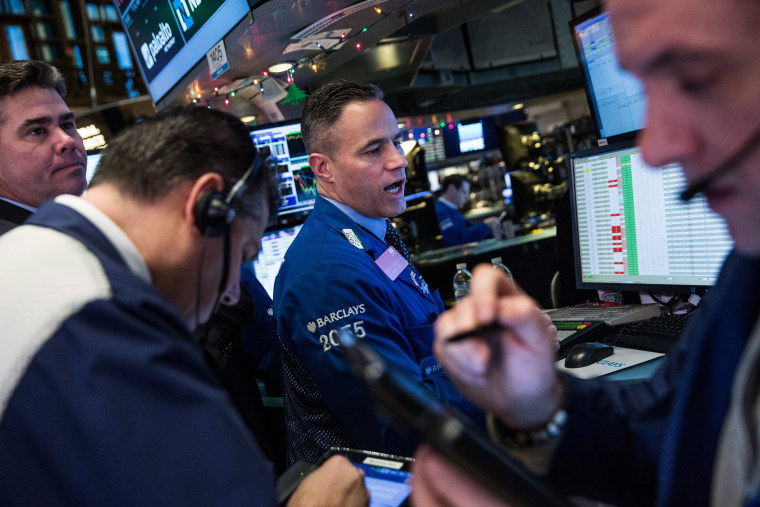The first trading day of 2016 gave stock market investors a taste of the volatility that market analysts say could be the new normal.
The Dow Jones industrial average lost 276 points, or nearly 1.6 percent, on Monday after data showing weaker-than-expected Chinese manufacturing activity triggered a 6.9 percent slide in the main Chinese stock exchange before circuit breakers kicked in and halted trading. The Standard & Poor's 500 and Nasdaq composite took similar poundings.
The problem for American investors isn’t the direct impact of China’s economic slowdown and its stock market volatility, since most investors aren’t directly exposed to Chinese equities, said Robert Johnson, director of economic analysis at Morningstar.
“Most people with a target date fund… will have some exposure to emerging markets, but generally the exposures there are usually 5 to 10 percent at most,” he said.
The bigger problem is the ripple effect a struggling Chinese economy has on global markets.
“With the Chinese economy slowing, it’s having negative repercussions around the world,” said Wayne Kaufman, chief market analyst for Phoenix Financial Services. “If they can’t stabilize, demand for copper, oil and other commodities go down.”
China Worries Send U.S. Stocks Tumbling; Dow Down 1.58 percent
As the world’s second-largest economy, China’s impact on financial markets around the world is big and growing. The finances of countries ranging from mining-heavy Australia to ones with oil-dependent economies like Venezuela are threatened when China’s appetite for their exports wanes.
Mitchell Goldberg, president of ClientFirst Strategy, says that likely portends more volatility for U.S. and overseas markets as the extent of the China slowdown becomes clearer.
“I think that we’re in for something a little bit more bruising than just a quick reactive downdraft,” he said. “This is the end of a cycle.”
For American consumers and investors, China's slowdown is a mixed bag.
“In terms of the U.S. economy, we’re in very good shape,” San Francisco Fed President John Williams said in a CNBC interview Monday morning, citing low unemployment and other factors.
Gunmakers Buck Tide, Post Gains Amid Steep Stock Market Selloff
Inflation remains subdued, with gas and imported goods like clothing, furniture and electronics likely to remain cheap. But Johnson, the Morningstar analyst, said inflation in areas like housing and health care limit how much cheap imported goods can help American consumers.
“It’s getting a little bit harder to generalize,” he said.
“Today it’s China, tomorrow it could be ISIS, Wednesday it could be something else.”
What’s more, while China received most of the blame for Wall Street's tumultuous new year’s debut, it’s hardly the only overseas player with the ability to rock U.S. markets.
“You still have a lot of uncertainty globally with the economy and inflation and geopolitical issues,” said Greg McBride, chief financial analyst at Bankrate.com. “Today it’s China, tomorrow it could be ISIS, Wednesday it could be something else.”
China's Economic Slowdown Is Top Business Story of 2015
In other words, this market volatility isn’t going away anytime soon. “It’s a trader’s market more than it’s an investor’s market,” Kaufman said. “It’s a very annoying, confusing environment.”
McBride concurred that this market could be tough for retail investors. “Right now traders are ‘Sell first, ask questions later,’ and I think that’s the pattern we’re going to see this year,” he said.
But experts warn that ordinary investors who attempt to follow the day traders’ lead can get burned by selling or buying too soon.
“People think if a stock is down 5 to 10 percent, it’s a bargain, I’m going to jump on it. But when a cycle ends, it takes years to correct itself,” said Goldberg of ClientFirst Strategy, referring to the end of China’s strong economic growth.
McBride, the Bankrate.com analyst, agreed that most investors are better off riding out the markets’ rough seas.
“Don’t try to time the market, don’t sell in a panic,” McBride advised. “Your long-term financial security will benefit from it.”
